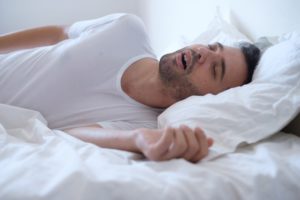
Like many people, you can’t imagine life without your pet. Thus, you and your domesticated friend are virtually unattachable, often sleeping in the same bed. If you’ve been diagnosed with sleep apnea in Columbus, could having your pet nearby when you rest further complicate the condition? Continue reading to find out.
Why People Sleep with Pets
Research shows that having a pet nearby when sleeping can be quite relaxing. It can provide a sense of security, which is even more important for people who live alone. In a study of 150 pet owners, the following data points caught researchers’ attention:
- Around 56% of pet owners allowed their pets to sleep in the same bed.
- Only 20% of owners reported that the pets were disruptive.
- Around 41% of pet owners reported that their animals provided a sense of companionship and relaxation.
The above statistics demonstrate how emotionally helpful having pets nearby can be. Unfortunately, their close proximity when sleeping can pose difficulties when it comes to recovering from sleep apnea.
The Problem with Sharing Your Bed with Your Pet
In a study of 40 dog owners, researchers at the Mayo Clinic measured the time each adult slept nightly for a week. To provide researchers with more data, the owners answered questions about where they slept in proximity to their dog each night.
Owners who didn’t share a bed with their dog rested better than their counterparts who slept with their dog. The members of the latter group were aroused from their sleep several more times than those who didn’t share their bed. This shows a possible connection between increased sleep apnea issues and pet proximity.
How Pets Can Worsen Sleep Apnea Symptoms
The most common form of sleep apnea is obstructive sleep apnea (OSA), which is brought on by a partial or full blockage of the airway. Just as pet dander can contribute to allergies, it can also exacerbate any sleep apnea symptoms.
Based on the information gathered by the Mayo Clinic about pets and sleep apnea, it’s best to make your bedroom a pet-free zone at night. Therefore, you can avoid any setbacks in your sleep apnea treatment and rest comfortably. The good news is that as soon as day breaks, you can get back to hugging and playing with your pet!
About the Author
Dr. Eric Buck is a graduate of The Ohio State University College of Dentistry. Because he understands just how important to it is to get a good night’s sleep, he has received training in treating sleep apnea. Additionally, Dr. Buck maintains professional affiliation with the American Academy of Dental Sleep Medicine. He helps patients rest better and enjoy improved overall health at The Columbus Sleep Center, and he can be reached for more information or to schedule a visit through his website.
